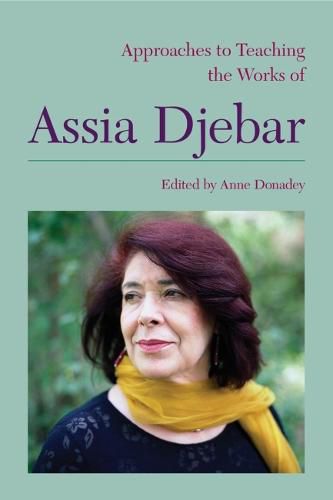Readings Newsletter
Become a Readings Member to make your shopping experience even easier.
Sign in or sign up for free!
You’re not far away from qualifying for FREE standard shipping within Australia
You’ve qualified for FREE standard shipping within Australia
The cart is loading…






A significant and prolific francophone writer and filmmaker, Assia Djebar is celebrated for her experimental, multilingual prose and her nuanced, imaginative representations of Algeria. From her first novel, La soif (The Mischief), to her final book, Nulle part dans la maison de mon pere ( No Place in My Father’s House ), she offers a wealth of pedagogical and theoretical possibilities.
Part 1, Materials, presents valuable teaching resources, including biographical information, French- and English-language editions of Djebar’s writing, and secondary works. In part 2, Approaches, contributors address the issues of and controversy surrounding her oeuvre, drawing on a range of interdisciplinary approaches and classroom strategies. Topics in the volume include translation studies, Islamic feminism, colonial and postcolonial contexts, autobiographical writing, historiography, postmodern and avant-garde literary experimentation, and visual culture. Gayatri Chakravorty Spivak provides an afterword. This volume makes clear the political, intellectual, and artistic importance of Djebar.
$9.00 standard shipping within Australia
FREE standard shipping within Australia for orders over $100.00
Express & International shipping calculated at checkout
A significant and prolific francophone writer and filmmaker, Assia Djebar is celebrated for her experimental, multilingual prose and her nuanced, imaginative representations of Algeria. From her first novel, La soif (The Mischief), to her final book, Nulle part dans la maison de mon pere ( No Place in My Father’s House ), she offers a wealth of pedagogical and theoretical possibilities.
Part 1, Materials, presents valuable teaching resources, including biographical information, French- and English-language editions of Djebar’s writing, and secondary works. In part 2, Approaches, contributors address the issues of and controversy surrounding her oeuvre, drawing on a range of interdisciplinary approaches and classroom strategies. Topics in the volume include translation studies, Islamic feminism, colonial and postcolonial contexts, autobiographical writing, historiography, postmodern and avant-garde literary experimentation, and visual culture. Gayatri Chakravorty Spivak provides an afterword. This volume makes clear the political, intellectual, and artistic importance of Djebar.